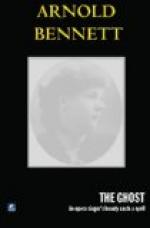“You remember the accident
on the stage which led to our
meeting. That accident
was caused by sheer terror—the terror
of an apparition more awful
than any that had gone before.
“Still I persisted—I persisted in my hopeless love. Then followed that unnamed malady which in vain you are seeking to cure, a malady which was accompanied by innumerable and terrifying phenomena. The malady was one of the mind; it robbed me of the desire to live. More than that, it made life intolerable. At last I surrendered. I believe I am a brave man, but it is the privilege of the brave man to surrender without losing honor to an adversary who has proved his superiority. Yes, I surrendered. I cast out love in order that I might live for my art.
“But I was too late. I had pushed too far the enmity of this spectral and unrelenting foe, and it would not accept my surrender. I have dashed the image of Rosa from my heart, and I have done it to no purpose. I am dying. And so I write this for you, lest you should go unwarned to the same doom.
“The love of Rosa is worth dying for, if you can win it. (I could not even win it.) You will have to choose between Love and Life. I do not counsel you either way. But I urge you to choose. I urge you either to defy your foe utterly and to the death, or to submit before submission is useless.
“Alresca.”
I sat staring at the paper long after I had finished reading it, thinking about poor Alresca. There was a date to it, and this date showed that it was written a few days before his mysterious disease took a turn for the better.
The communication accordingly needs some explanation. It seems to me that Alresca was mistaken. His foe was not so implacable as Alresca imagined. Alresca having surrendered in the struggle between them, the ghost of Lord Clarenceux hesitated, and then ultimately withdrew its hateful influence, and Alresca recovered. Then Rosa came again into his existence that evening at Bruges. Alresca, scornful of consequences, let his passion burst once more into flame, and the ghost instantly, in a flash of anger, worked its retribution.
Day came, and during the whole of that day I pondered upon a phrase in Alresca’s letter, “You will have to choose between love and life.” But I could not choose. Love is the greatest thing in life; one may, however, question whether it should be counted greater than life itself. I tried to argue the question calmly, dispassionately. As if such questions may be argued! I could not give up my love; I could not give up my life; that was how all my calm, dispassionate arguments ended. At one moment I was repeating, “The love of Rosa is worth dying for;” at the next I was busy with the high and dear ambitions of which I had so often dreamed. Were these to be sacrificed? Moreover, what use would Rosa’s love be to me when I was dead? And what use would my life be to me without my love for her?




